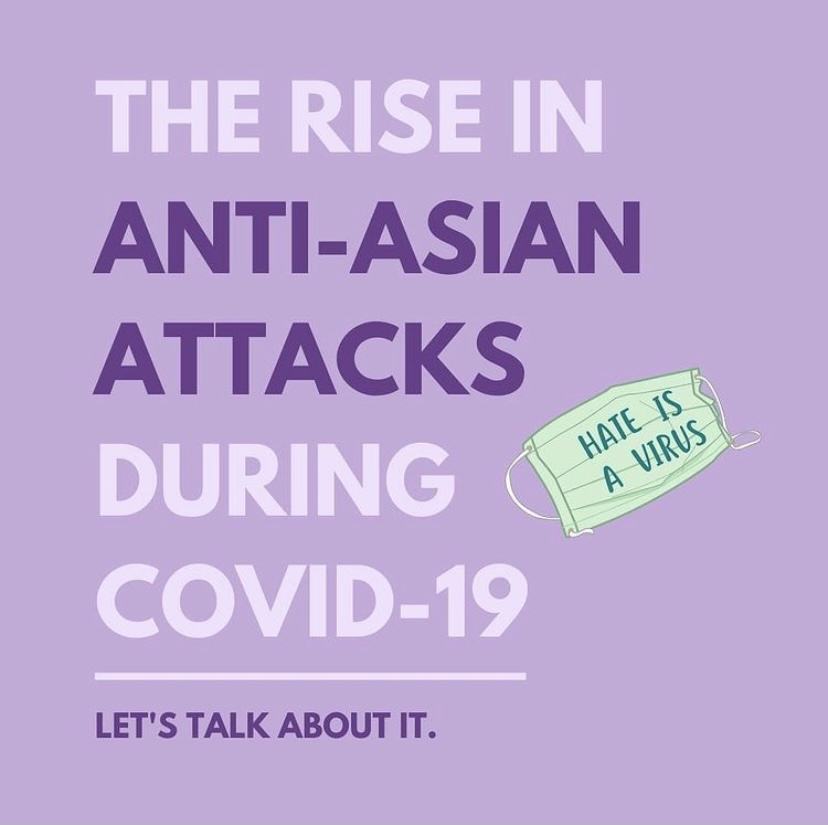COVID-19 leads to a rise in anti-Asian American hate crimes
Photo courtesy of @thenextgenerasian on Instagram
Graphic about the rise in discrimination against Asians
Over the past few weeks, Instagram has been flooded with posts about an 84-year-old Thai American man living in San Francisco who was shoved to the ground and died a few days later. While at first glance this act of violence may seem like an isolated incident, in reality, it’s just one example of the increase in discrimination and violence against the Asian American and Pacific Islander community since the start of COVID-19.
According to voa.com, there was a 150 percent increase in anti-Asian American hate crimes this past year. Since the start of the pandemic, StopAAPIHate.com, a website that allows users to self-report hate incidents, recorded more than 3,000 incidents across the U.S. However, not every incident of discrimination is documented or reported to the police.
Hate crimes are acts of violence or discrimination that are motivated by the offender’s bias against someone’s race, religion, disability or sexual orientation. While the pattern of AAPI discrimination, mostly against Asian American elders, fits the definition of a hate crime, in order for someone to be charged for committing a hate crime there needs to be clear evidence that the crime was fueled by hatred for someone’s identity. This evidence can include the use of derogatory words, a confession from the attacker or a history of racism. According to nytimes.com, because of a lack of evidence, many attacks on Asian Americans aren’t charged as hate crimes. So, while the statistics show an increase in anti-Asian American hate crimes, the number may be even larger than recorded.
Many believe that the rise in anti-Asian American hate crimes is a result of the hateful rhetoric used to discuss China’s relationship to COVID-19. The virus, which originated in Wuhan, China, has been called the “China Virus” by former President Donald Trump. According to time.com, Co-founder of Stop AAPI Hate Russel Jeung said, “There’s a clear correlation between President Trump’s incendiary comments, his insistence on using the term ‘Chinese virus’ and the subsequent hate speech spread on social media and the hate violence directed towards us…It gives people license to attack us. The current spate of attacks on our elderly is part of how that rhetoric has impacted the broader population.”
Kimmy Su, a WHS junior, shares similar beliefs. “I think the reason why hate crimes against Asian-Americans have been on the rise recently has been due to COVID. A lot of people are angry that the pandemic is still happening, and they’re taking out that anger on innocent people.”
Cat Valencia, a WHS senior, is currently bringing awareness to the issue of anti-Asian hate crimes over social media.
“I am Asian American. My father is Filipino. So these crimes kind of hit a bit closer to home than others,” she said. “When I read headlines about, say, an Asian American man was attacked in New York, or an Asian American elder was killed in San Francisco, I can’t help but think that that could have been my dad, or that could have been my grandmother.”
Many Asian American celebrities are engaging in the same type of activism. Actress Olivia Munn joined other Twitter users in an effort to help the NYPD apprehend a suspect in an anti-Asian hate crime by tweeting a photo of the suspect. She also noted that the woman who was attacked was the mother of one of her friends. The man was eventually located and arrested by the NYPD.
But it’s not just celebrities and students who are dedicated to stopping the rise in anti-Asian hate crimes. Both the federal and state government have enacted legislation to protect Asian Americans. On Jan. 26, President Biden signed a memorandum denouncing the discrimination of the AAPI community and also included ways in which the Justice Department can help victims report instances of hate. In addition, New York City Mayor Bill de Blasio formed an Asian Hate Crime Task Force which consists of 25 detectives of Asian descent who help guide victims of hate crimes through the judicial process.
In addition to governmental involvement, citizens took to the streets to protest against anti-Asian hate. At a “Rise Up Against Anti-Asian Hate” rally on Feb. 27, hundreds of New Yorkers gathered in Foley Square, holding up signs that read, “I am not a virus,” and “Stop attacking Asian elderly!” The rally also had speakers who shared their experiences. One of these speakers was 61-year-old Noel Quintana, who was attacked on the subway and had his face slashed with a box cutter.
While the U.S. is taking a step in the right direction to combat these hate crimes, the hard work is not over yet. “I think that it’s definitely a good start,” said Valencia. “In the past, there’s been like nothing or the bare minimum because this wasn’t an issue that was ever talked about. I’m very happy that people are doing things about it, and [the issue] is getting a more national platform.”
There are multiple avenues people can take to continue to stop AAPI discrimination. “I think that education is the best way to combat these hate crimes. Informing people about what’s going on and how they can help is a very peaceful, but powerful method,” said Su.
There are a lot of resources that are available to learn about and get involved with, combating hate against Asian Americans. Not everyone can donate or attend rallies, two things that according to Valencia, are very helpful and make a big impact. However, if you are able to donate, a curated list of organizations can be found at nymag.com.

